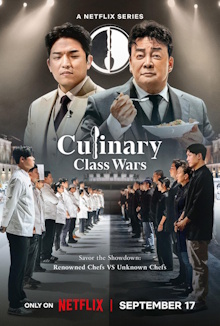My wife asked to watch this cooking competition reality show and indeed I’ve even heard of this one in the online spaces I frequent. I’ve never watched any show of this kind before so I thought I’d do it at least once. My first impression is that it looks so lavishly produced with gigantic, amazing looking sets and vibes that were obviously inspired by Squid Game. I was also flabbergasted by how much the two judges must eat when the show starts with 100 competitors. The numbers do get whittled down quickly and the producers were incredibly creative in devising different formats for each round. I don’t care for the tricks they use to generate conflict but fortunately there’s not much of that. I have to admit that this was a better show than I’d expected and I enjoyed it.
The show purports to identify the best chef in Korea out of the 100 participants. Their first gimmick is to separate the proven veterans from the up and coming chefs so the former are called the White Spoons while the latter are called Black Spoons. The 80 Black Spoons have to pass a preliminary elimination round which immediately reduces them to a more manageable 20. To further accentuate this so-called class conflict, the Black Spoons aren’t allowed to use their real names and must use nicknames instead while the White Spoons are introduced by their real names. Two other chefs serve as judges, Paik Jong-won, who is apparently a famous television host in Korea, and Anh Sung-jae, only Michelin three-star chef in the country. The moment the show really starts to stand out is when the Black Spoons are directly matched against the White Spoons in a series of one-on-one contests in which the judges are blindfolded. Without knowing who made what and not being able to even see the dishes, they must decide who is the winner through taste alone. The subsequent rounds keep changing the rules too in order to test every aspect of the chef’s skills, including cooking a large batch of food to satisfy 100 diners, improvising with ingredients from a typical convenience store and so on. Combined with the expansive sets and high production values, it’s no wonder that this has been a hit.
I’m the furthest thing from a foodie so it’s a surprise to me to have liked this as much as I did. The sheer expertise, experience and creativity on display here is mind blowing and you can tell how much love and time the chefs put into experimenting with combinations and techniques. Generated drama or not, there’s no doubt that the show did a great job is separating out the truly skilled chefs from the poseurs. Early on, there are joke chefs in funny costumes and theatrical gimmicks who all get winnowed out very quickly. By the end, the chefs are so incredibly good that the quality differences really are marginal and so the winner might be determined by sheer exhaustion, a single mistake or just bad luck. It’s illuminating that while a few chefs did well by being able to cook established Korean dishes to a very high standard, the finalists are all effectively Western fine dining-type chefs who are able to do everything. It’s also impressive how much food the two judges managed to eat as part of the judging process. The two of them have different preferences and standards with chef Anh being more exacting while Paik takes into account the broader tastes of the general public. But the interplay between two as well as their insightful commentary no doubt make it a better show.
I fear that my trying to talk about individual chefs who stood out would only highlight my own woeful knowledge of cuisine. Still it would be remiss not to say anything. Of particular note was Choi Hyun-seok who seemed ruthless in wanting to win, sweeping up all of the best ingredients in the seafood competition for example before even knowing what he wanted his team to cook and gaming the rules for the restaurant portion. American celebrity Edward Lee was also fascinating. At times, he struggled with his weak grasp of the Korean language and lack of familiarity with the local market, impeding his ability to coordinate with others. Yet his mastery of the physical characteristics of ingredients is simply astounding, cutting across all styles of cuisine. Finally it’s impressive how chefs like Auntie Omakase are able to cook a large amount of food in a short amount of time. Yet usually the best chefs are those who make tiny portions of food with exacting precision in everything from cutting the ingredients to plating the dish.
My least favorite parts were the fake trash talking that the show’s producers seem to have encouraged and the contrived class war vibes. I also thought that the surprise change in the rules in the restaurant competition to generate drama was extremely unfair. The ad hoc team that resulted totally had the deck stacked against them. Fortunately most of the competitors don’t seem to have any real beef against each other and are mutually admiring. Anyway this was such a hit that I’m sure there will be more seasons. However watching this first season is likely enough for me just to see what these shows are like.
